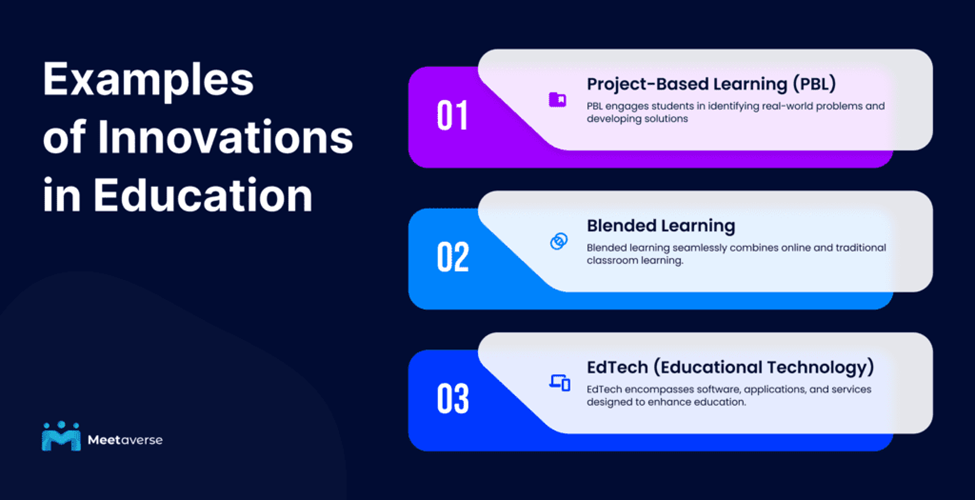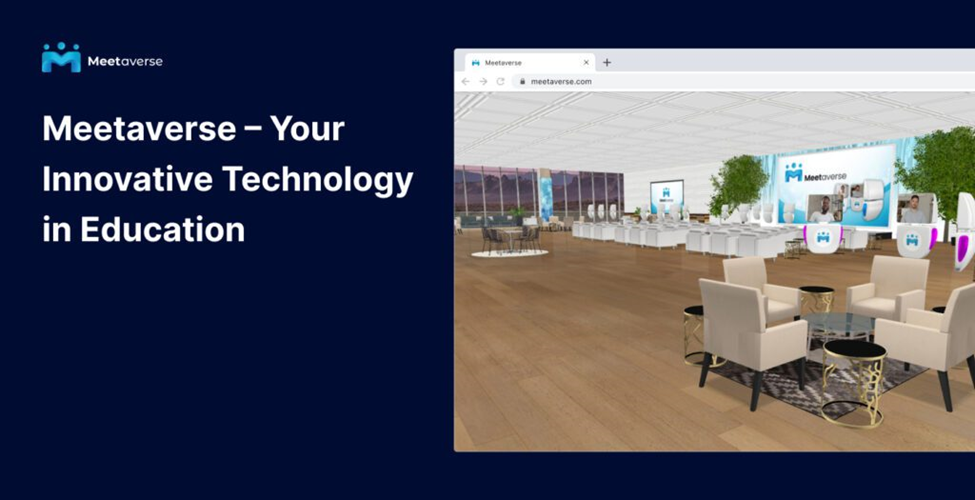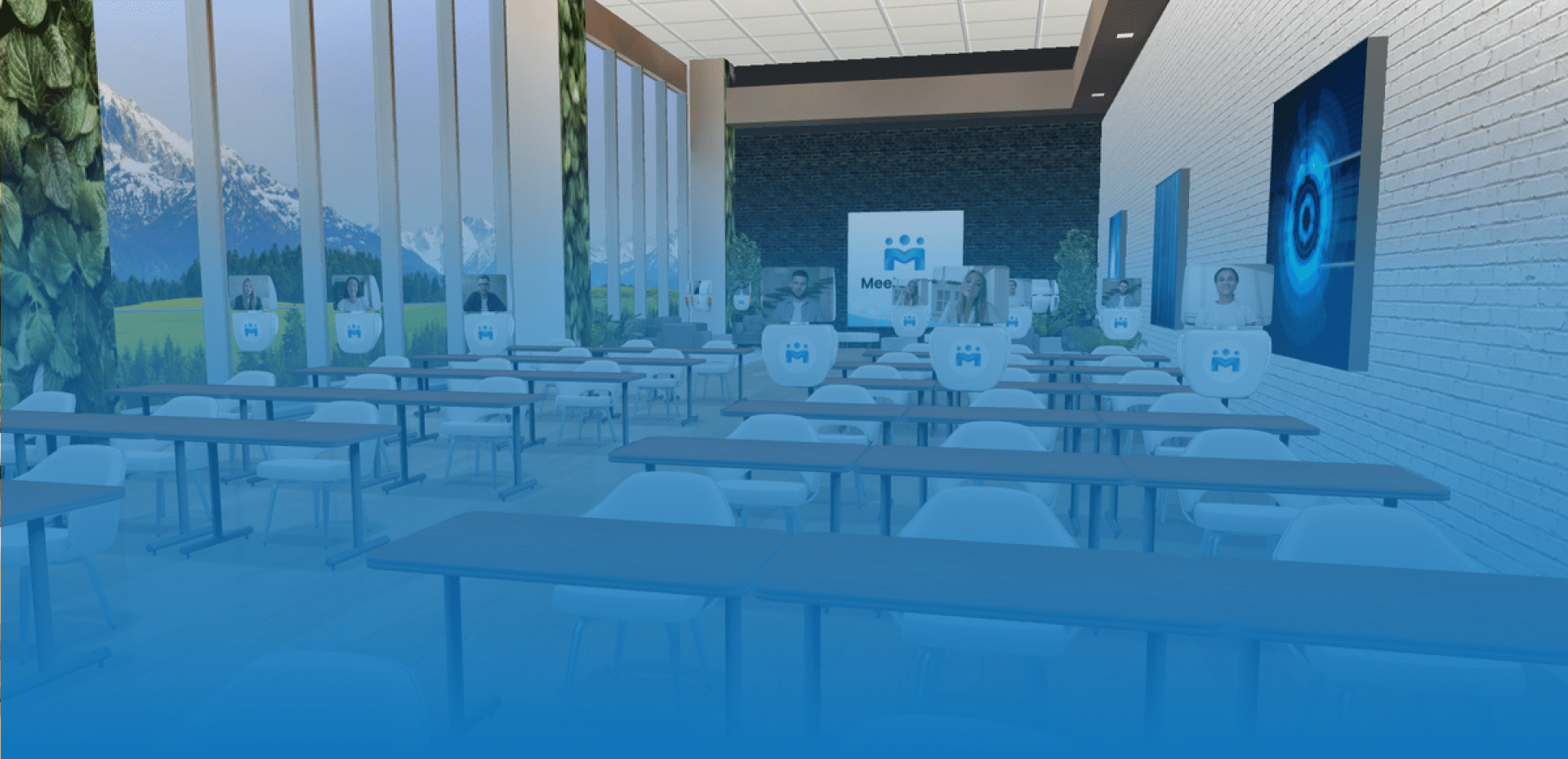
In the world of education, keeping up with tech changes is vital for a dynamic learning experience. The year 2024 brings forth a wave of innovations to transform the educational landscape. It harnesses the power of technology to revolutionize teaching and learning.
It’s a common experience to attend online training sessions that are uninspiring and forgettable. This is where innovation education comes into play. Imagine training programs that equip your team with the latest skills, ignite their curiosity and drive, and transform their regular job into a continuous discovery and growth journey. This is exactly what ambitious, visionary professionals seek.
Now, let’s explore the top 6 innovations in education focusing on the emerging field of metaverse education that are set to revolutionize the learning experience in 2024.
What is innovation in education?
Discussing what is innovative education in the corporate world, we explore how creative changes and new approaches can revolutionize employee training and development. This concept of education innovation is all about adapting and evolving rather than inventing from scratch. It’s about looking at old problems through a new lens and finding innovative technologies in education that resonate with the modern workforce.
In the realm of employee educational innovation, it takes various exciting forms. Let’s take a closer look:
Examples of Innovations in Education

Importance of innovations in education
In the realm of employee education, the role of innovation cannot be overstated. Educational technology innovations and the burgeoning education metaverse are redefining how we approach learning in the workplace.
As we integrate these innovations into employee training, we’re not just imparting knowledge; we’re cultivating vital skills like creativity, adaptability, and resilience – skills essential for thriving in today’s fast-evolving industries.
This shift towards education and innovation is crucial for professionals, especially those in the final stages of university studies or stepping into the workforce. It equips them with the hard skills needed for their roles and the soft skills that pave the way for long-term success. By embracing technological advancements in education, like augmented reality in education, we ensure that employees are familiar with and adept at navigating the ever-changing technological landscape.
As 2024 unfolds, education is poised for a transformative leap, fueled by trends that shatter conventional boundaries and redefine how we learn. Microlearning, embracing the power of bite-sized knowledge nuggets, is gaining momentum as Startus Insights reports a 145% increase in microlearning startups since 2015. This shift reflects our desire for knowledge that seamlessly integrates into our busy lives.
The importance of innovation in education is about more than just staying current, it’s about preparing for the future. Whether through the immersive experiences of the education metaverse or the personalized approaches of educational technology innovations, we’re shaping a workforce that’s resilient, adaptable, and equipped to meet the challenges of a dynamic professional world. In doing so, we’re enhancing immediate job performance and laying the foundation for enduring success in an ever-evolving career landscape.
Looking for a new and revolutionary L&D solution?
Leave your contact information and a Meetaverse professional will be happy to tell you more about how we can help
Top 6 Innovations in Education to Transform 2024’s Learning Experience
Adaptive learning platforms (ALPs) are revolutionizing employee training by tailoring the learning experience to each individual’s needs and preferences. These platforms use AI and algorithms to analyze an employee’s knowledge gaps, learning style, and performance and then adjust the training content and pace accordingly.
AI-powered personalization emerges as another defining trend, with 63% of educators believing AI will significantly impact education in the next five years. Adaptive learning platforms, tailoring content to individual needs and preferences, are poised to become the new norm, ensuring every learner embarks on an optimal learning journey.
OCLEs are online platforms that facilitate interactive learning experiences for groups of employees. They go beyond traditional e-learning by promoting active participation, knowledge sharing, and peer-to-peer collaboration. Virtual learning environments offer video calls, document sharing, group projects, and interactive whiteboards. They create an exciting learning spaces.
The global OCLE market is expected to reach $3.8 billion by 2027, growing at a CAGR of 22.1% from 2022 to 2027. This signifies the increasing adoption and value organizations place on collaborative learning.
VR/AR technology is revolutionizing the field of employee training by offering immersive and interactive learning experiences that go beyond traditional methods.
Applications of VR/AR in employee training:
Gamification in employee training is the process of incorporating game-like elements like points, badges, leaderboards, and challenges into learning experiences. This can significantly boost engagement, motivation, and knowledge retention among employees.
Gamified training sessions lead to a 27% increase in knowledge retention compared to traditional training, thanks to the interactive and immersive nature.
Concept of education in the metaverse
The metaverse isn’t just for gamers anymore! It’s rapidly emerging as a powerful tool for employee training, offering immersive and interactive experiences that go beyond traditional methods.
Imagine honing your sales skills by navigating a virtual customer meeting, practicing crisis management in a simulated boardroom, or mastering technical procedures in a 3D replica of your work environment. AI companions guide you every step of the way, offering personalized feedback, adapting to your learning pace, and providing on-demand support whenever you need it. That’s the potential of the education metaverse.
Bridging the gap between academics and professional life, the metaverse promises immersive virtual corporate training spaces where employees hone their skills in simulated workplaces, preparing them to hit the ground running in the real world.
The potential of education in metaverse for immersive learning experiences
The metaverse holds exciting possibilities for education:
In the United States alone, the metaverse education market is expected to have 9.1 million users by 2030, with a user penetration rate of 2.6%.
While immersive metaverse office spaces are still in their early stages, they hold the potential to transform the future of student collaboration, offering virtual landscapes for team projects, peer learning, and even simulated internships within the digital realm.
AI-powered assistants and chatbots are redefining employee training, becoming virtual teachers offering personalized, accessible learning experiences. Imagine instant onboarding guidance, tailored skill development through gamified interactions, and 24/7 on-demand support, all with engaging conversations. This trend is reshaping training, with giants like SAP and Cornerstone offering chatbot solutions, and the focus shifting towards soft skills development and data-driven performance improvement. While challenges like data security and seamless integration exist, the potential for cost-effective, engaging, and personalized learning is undeniable.
This AI revolution in training promises to empower employees and boost organizational success.
Meetaverse – Your Innovative Technology in Education
Meetaverse stands at the forefront of innovative technology in education, offering a metaverse platform that immerses users in a captivating universe, elevating the learning experience. This platform transcends traditional boundaries by facilitating conferences, online classes, and the creation of personalized spaces, introducing a new dimension to education.
How Meetaverse utilizes metaverse technologies for immersive learning

Meetaverse is not just a platform, it’s a gateway to a future where education and innovation converge, creating dynamic, engaging, and effective learning environments.
Book a demo to learn more about the education process in the metaverse for your company.
The future of education is not merely about acquiring knowledge; it’s about cultivating a mindset of curiosity, adaptability, and lifelong learning. It’s about embracing the unknown with confidence, knowing that we possess the tools and resilience to navigate any challenge that lies ahead. Education 2024 invites us to step beyond the boundaries of the classroom and into a boundless universe of learning possibilities.
Looking for a new and revolutionary L&D solution?
Leave your contact information and a Meetaverse professional will be happy to tell you more about how we can help
An innovative education goes beyond traditional methods and embraces creative approaches to learning. It prioritizes personalization, engagement, and adaptability, ensuring students master essential skills and critical thinking within a dynamic environment.
Defining the “best” education innovation is subjective, as every learner thrives on different approaches. However, trends like adaptive learning platforms, immersive VR/AR experiences, and AI-powered personalized learning hold immense potential. Ultimately, the “best” innovation is the one that effectively engages and empowers each individual learner to reach their full potential.
Metaverse education leverages the virtual world to create immersive learning experiences that transcend physical limitations. Think of it as a 3D learning platform with limitless environments and personalized learning paths.
Metaverse education refers to using immersive virtual worlds to create blended learning experiences that transcend physical limitations. It leverages virtual reality (VR), augmented reality (AR), and other technologies to provide students with interactive 3D environments for learning, collaboration, and exploration. Think of it as a platform where classrooms, learning activities, and social interactions take place within a virtual universe, offering boundless possibilities for engaging and personalized education.
The metaverse holds the potential to:
Several applications are already emerging:
The tech landscape offers a plethora of exciting tools for educators:
The landscape of education is evolving, and universities are embracing the power...
read moreStep into the future of education with the online virtual classroom – an e...
read moreThe digital revolution has completely transformed our lives, and education is no...
read more

